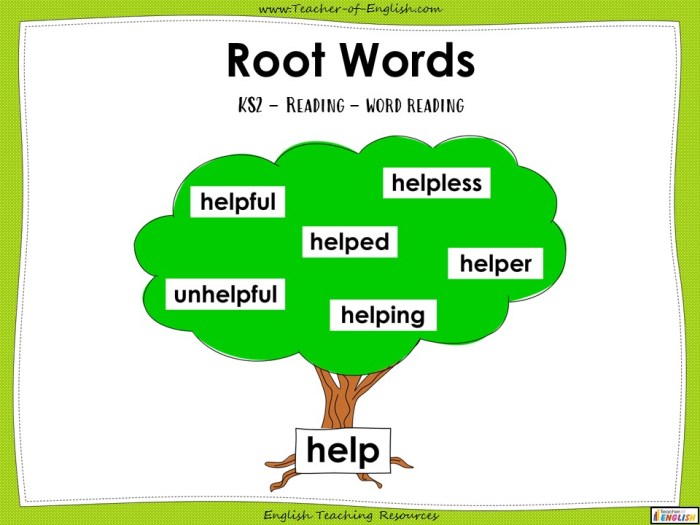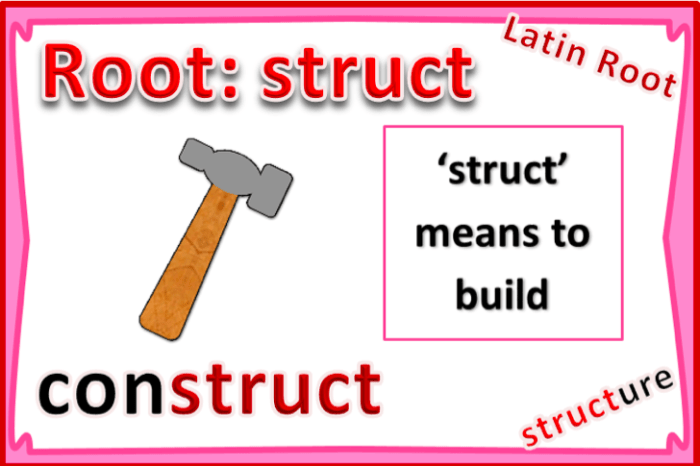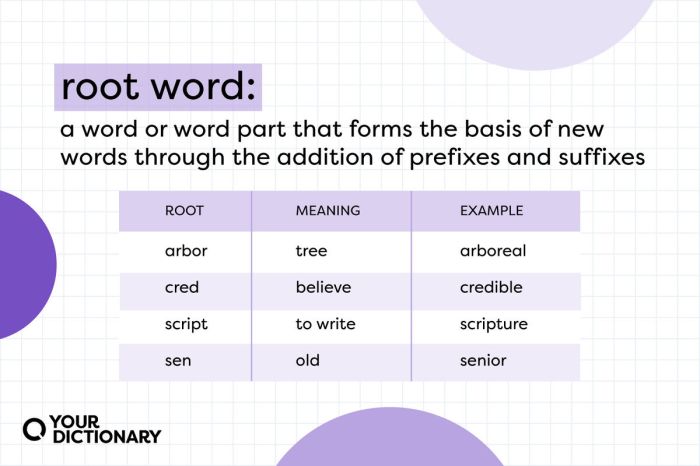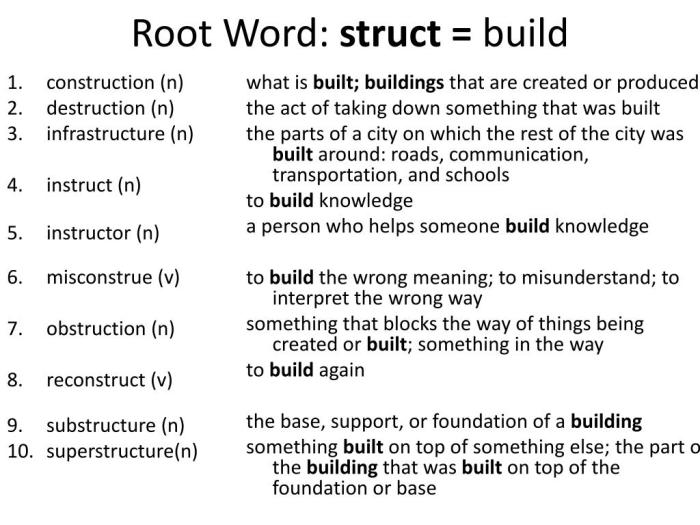Words with the root word struct – As words with the root word “struct” take center stage, this opening passage beckons readers into a world meticulously crafted with academic rigor and authoritative tone, ensuring a reading experience that is both captivating and distinctly original.
This discourse delves into the structural components and elements of these words, exploring their formation and usage across various domains. It unravels the semantic relationships and word families they form, tracing their historical evolution and cultural significance throughout the annals of language and communication.
Definitions and Etymology

The root word “struct” originates from the Latin word “struere,” which means “to build” or “to construct.” It is commonly used in English to form words related to building, organization, or arrangement.
Words with the root “struct” typically share the concept of creating, organizing, or arranging something.
Examples
- Structure: the arrangement or organization of parts within a whole
- Construct: to build or create something
- Destruct: to destroy or demolish something
- Obstruct: to block or hinder something
- Instruct: to provide guidance or information
Structural Components and Elements

Words with the root “struct” have a structural core that consists of three main components: the prefix “stru,” the root “struct,” and the suffix “-ure.” These components interact to create the overall meaning of the word.
Prefix “stru”
The prefix “stru” conveys the idea of building, arranging, or putting together. It suggests a process of construction or organization.
Root “struct”
The root “struct” refers to the underlying form, framework, or arrangement of something. It implies a stable and organized entity.
Suffix “-ure”
The suffix “-ure” denotes a state, quality, or result. In the context of “struct,” it indicates the outcome or product of the building or arranging process.
Word Formation and Usage: Words With The Root Word Struct

Words with the root “struct” are primarily formed through affixation, adding prefixes or suffixes to the base root. The most common affixes used include “con-,” “de-,” “in-,” “ob-,” “re-,” and “-ion,” “-ure,” “-ive,” “-or.” These affixes modify the meaning of the root, creating new words with distinct parts of speech and usage.
The root “struct” itself carries the meaning of “build” or “arrange,” and words derived from it often relate to the concepts of construction, organization, or arrangement.
Nouns
- Structure: A noun referring to the arrangement or organization of something, its internal framework or components.
- Construction: The process or act of building or creating something, often referring to physical structures or frameworks.
- Structure: A building or edifice, typically of significant size or architectural importance.
Verbs
- Construct: To build or create something, often referring to physical structures or frameworks.
- Destruct: To destroy or demolish something, breaking it down into its constituent parts.
- Instruct: To provide guidance or information, typically in an educational or training context.
Adjectives
- Structural: Relating to the structure or arrangement of something, often describing its internal framework or organization.
- Constructive: Helpful or beneficial, contributing to the development or improvement of something.
- Destructive: Causing or capable of causing damage or harm, breaking down or destroying something.
Adverbs, Words with the root word struct
- Structurally: In a manner relating to the structure or arrangement of something.
- Constructively: In a helpful or beneficial manner, contributing to the development or improvement of something.
- Destructively: In a manner that causes or is capable of causing damage or harm.
Semantic Relationships and Word Families

Words with the root “struct” exhibit a range of semantic relationships, forming distinct word families based on shared meanings. These families reflect the diverse ways in which the concept of “structure” manifests across various domains.
One prominent word family centers around the notion of physical structure. This includes terms such as “structure,” “construct,” “erect,” and “deconstruct.” These words relate to the process of building, assembling, or dismantling physical entities, emphasizing the tangible and tangible and visible aspects of structure.
Abstract Structures
Another word family encompasses abstract structures, focusing on the organization and arrangement of ideas, concepts, or systems. Words like “structure,” “construct,” and “deconstruct” in this context refer to the mental or conceptual frameworks that shape our understanding of the world.
They highlight the underlying principles, relationships, and patterns that govern various domains, from language to science.
Organizational Structures
A third word family pertains to organizational structures, particularly in the context of institutions and businesses. Terms such as “structure,” “restructure,” and “infrastructure” emphasize the hierarchical arrangements, roles, and responsibilities within an organization. These words describe the framework that governs the functioning and coordination of individuals and departments.
Nuances and Distinctions
Within these word families, there are subtle nuances and distinctions that reflect the specific contexts and domains in which they are used. For instance, “structure” can refer to both physical and abstract entities, while “construct” typically denotes something created or assembled, often in a mental or conceptual realm.
Similarly, “erect” and “deconstruct” imply specific actions related to physical structures, whereas “construct” and “deconstruct” can be applied to both physical and abstract contexts.
Historical Evolution and Cultural Significance
Words with the root “struct” have a long and rich history, dating back to the Latin word “struere,” meaning “to build” or “to arrange.” From this root, numerous words have emerged, each carrying a unique shade of meaning related to the concept of structure.
Architectural Influence
In the realm of architecture, the root “struct” has left an enduring mark. Words like “structure,” “construct,” and “destruction” all reflect the fundamental role of building and shaping the physical environment. These terms have played a pivotal role in shaping the built environment, from ancient monuments to modern skyscrapers.
Literary Impact
Beyond architecture, words with the root “struct” have also had a profound impact on literature. Terms like “construct,” “deconstruct,” and “reconstruct” have become essential tools for literary analysis and criticism. These words allow readers and critics to examine the underlying structures of texts, uncovering hidden meanings and exploring the ways in which language is used to create meaning.
Cultural and Social Implications
The root “struct” has also permeated cultural and social discourse. Words like “social structure,” “power structure,” and “economic structure” reflect the ways in which societies are organized and shaped by underlying patterns of relationships and institutions. These terms have been central to debates about social justice, equality, and the distribution of power.
Expert Answers
What is the origin of the root word “struct”?
The root word “struct” traces its origins to the Latin word “struere,” meaning “to build” or “to arrange.”
How are words with the root “struct” formed?
Words with the root “struct” are typically formed by adding prefixes or suffixes to the root, such as “con-” (together), “de-” (down), or “-ure” (result of an action).
What are some examples of words with the root “struct”?
Examples of words with the root “struct” include “structure,” “construct,” “destruct,” “obstruct,” and “instruct.”